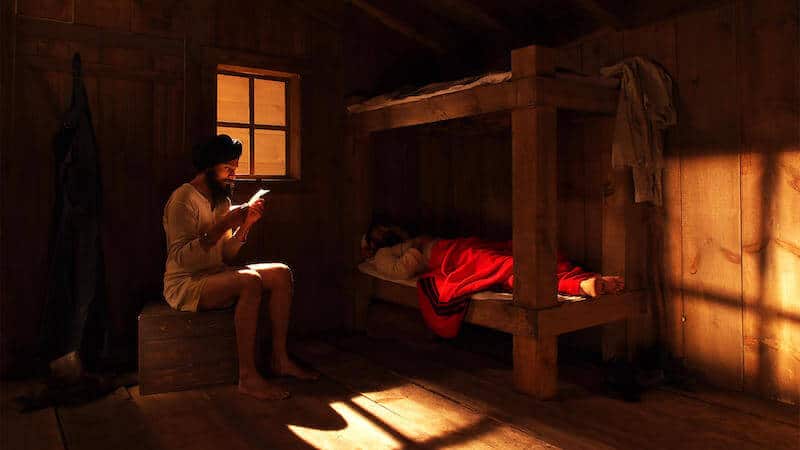Fear is the key
Seeking civic solidarity across divides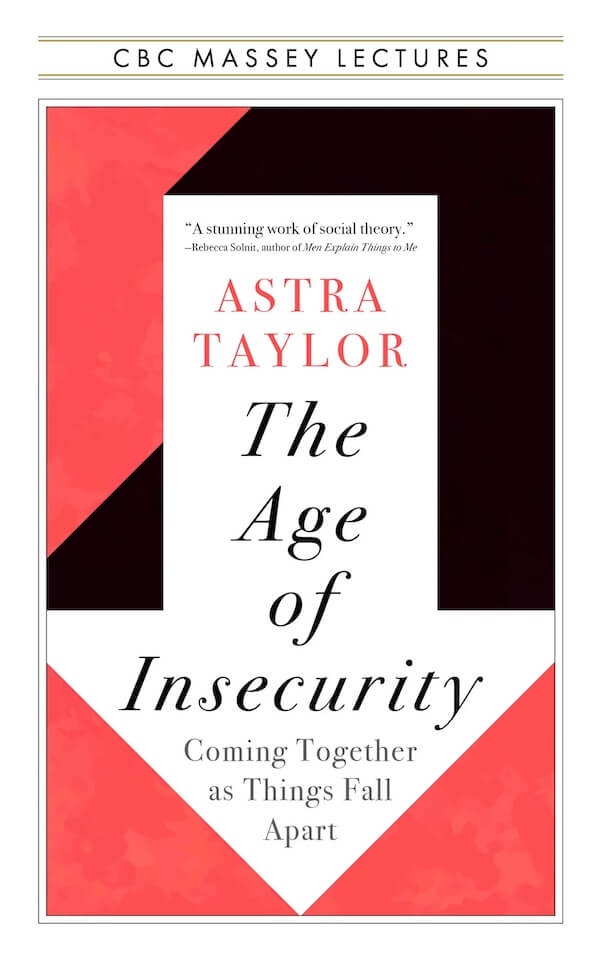
The Age of Insecurity: Coming Together as Things Fall Apart
The 2023 CBC Massey Lectures
By Astra Taylor, 2023
House of Anansi Press, 2023
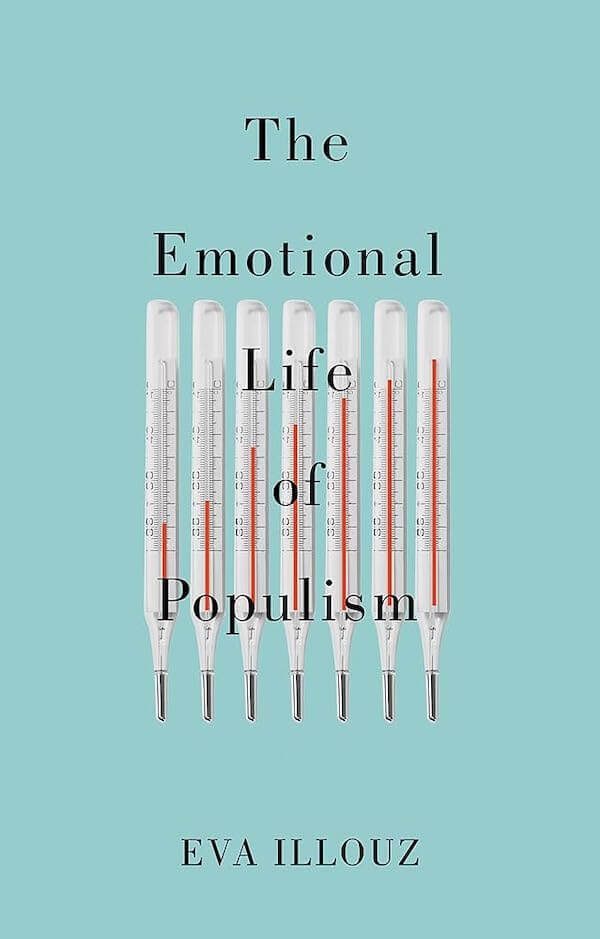
The Emotional Life of Populism: How Fear, Disgust, Resentment, and Love Undermine Democracy
By Eva Illouz
Polity, 2023
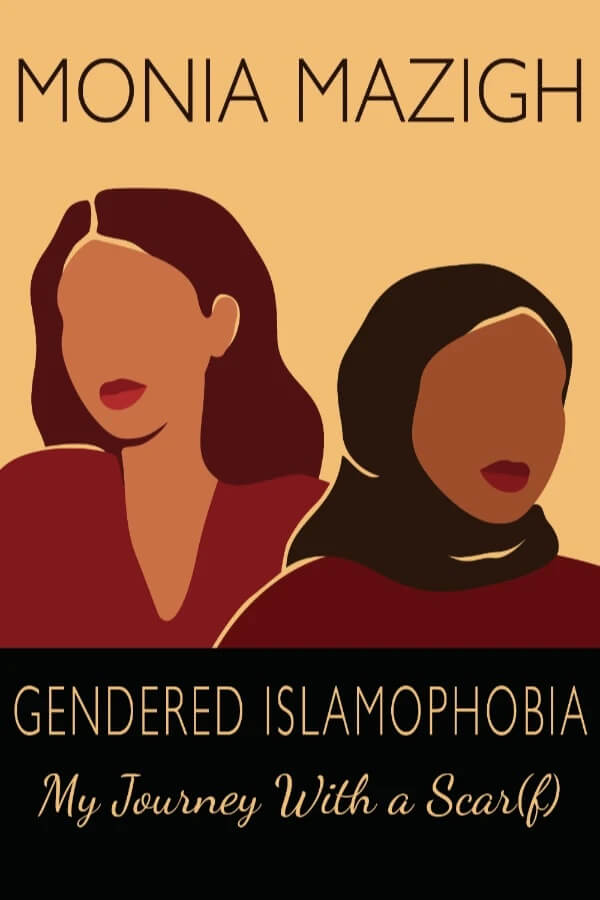
Gendered Islamophobia: My Journey With a Scar(f)
By Monia Mazigh.
Mawenzi House, 2023

Share Article
“In these times, it’s hard to have the kind of wedding you want,” consoles the wife of a village mukhtar (chief), when he tells her the Israeli military governor will only permit the event amidst a curfew if he and fellow officers are invited—a bargain at the heart of Michel Khleifi’s lyrical 1987 film, Wedding in Galilee1merip.org/1988/09/wedding-in-galilee/. While neither side has any trust in the other, the film humanizes the lethal politics in a setting steeped in Palestinian tradition. Patriarchy is fiercely resisted by young women2Tim Kennedy, “Wedding in Galilee (Urs al-Jalil),” Film Quarterly, Vol. 59, No. 4 (Summer 2006), 40-46: doi.org/10.1525/fq.2006.59.4.40. When a female officer passes out in the heat, the village women not only nurse her but drape her in local garb. And when a thoroughbred strays onto an Israeli minefield, army officers join in a rescue mission. Angry youths plotting to kill the governor are thwarted by villagers fearing collective punishment.
Months after the film’s release, the first Intifada (uprising, 1987-93) broke out in the West Bank and Gaza Strip, where twenty years of military occupation boiled over3Intifada: The Palestinian Uprising Against Israeli Occupation, ed. Zachary Lochman & Joel Beinin (Washington, DC: Southend Press, 1989).. This presaged a decade where the fall of the Berlin Wall yielded the opposite of a post-cold war “peace dividend.”4Sanjeev Gupta, et al, “The Elusive Peace Dividend,” Finance & Development (IMF), 39:4 (2002): https://www.imf.org/external/pubs/ft/fandd/2002/12/gupta.htm Remarkably violent conflicts–with an estimated 4m deaths—broke out not only in ex-Yugoslavia and Rwanda, but also in Afghanistan, Algeria, the former Soviet republics, Iraq, East and West Africa, and Yemen; there were insurgencies in Southeast Asia, Mexico, and Turkey. More have since broken out in Myanmar, Syria, Sudan, and Ukraine, with the Gaza occupation boiling over again.

The upshot? Crises of migration, food security, financial stability, and a sustainable rules-based global order. Add to this the perils of a climate emergency and we have what Astra Taylor’s 2023 CBC Massey Lectures bill as The Age of Insecurity. “Well before Covid-19 swept the globe, compounding suffering and leaving greater instability in its wake, insecurity was everywhere,” notes Taylor. Yet “the ways we try to make ourselves more secure—money, property, possessions, police, the military—have paradoxical effects, undermining the very security we seek,” she argues. In essence, insecurity is hardwired in our dominant economic and political systems, not just their byproduct.
What gives freshness to Taylor’s account is her animated chase into the variegated histories of all that we cherish and fear in an insecure world, from the Universal Declaration of Human Rights, the social contract, and populist politics, to ecological stewardship, capitalist consumption, and commercial mortgages and insurance. Born in Winnipeg and currently based in the US, Taylor is unsparing about stories that we tell ourselves as settler societies built on Indigenous dispossession and slavery. Today, our daily reality is a market-driven uncertainty that lands us in a “risk society.”
This is captured by the stakes in lawsuits such as Mathur v. Ontario5osler.com/en/resources/regulations/2023/first-justiciable-climate-claim-in-ontario-mathur-v-ontario against the sharp lowering of greenhouse gas emissions targets by Doug Ford’s government. Among the youth litigants in that case is First Nations artist and activist Shelby Gagnon, who tells Taylor that climate change is ultimately about sovereign identity for already vulnerable Indigenous communities. In December 2023, the Federal Court of Appeal ruled that the harm caused by climate change, including “loss of land and culture, food insecurity, injury and death,” merits scrutiny as a violation of the right to security of the person under the Canadian Charter of Rights & Freedoms6static1.squarespace.com/static/655a2d016eb74e41dc292ed5/t/657a5cd15f10f25ec276f 423/1702517970249/2023.12.13.La+Rose+Appeal+Decision.pdf. This echoes recent judicial decisions worldwide, including the idea that ecosystems have entitlements to security.
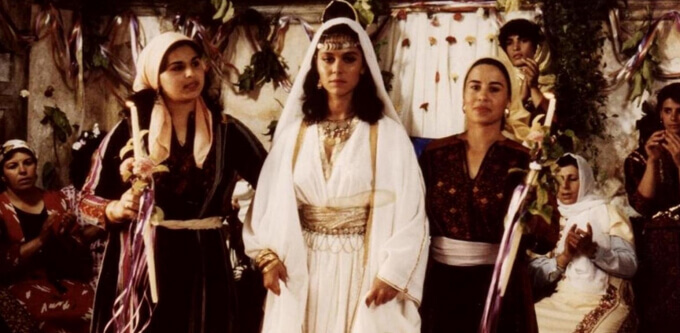
Taylor’s plea that we embrace an “ethic of insecurity” amounts to taking seriously the inherently insecure nature of the human condition, but also the “manufactured” lack of security in our governing systems (all the way to seductive digital platforms). A striking validation comes from the Israeli sociologist Eva Illouz in The Emotional Life of Populism. She burrows into her country’s Zionist ideology as it paves the way to “securitist democracy and fear,” where “geography and ethnicity” override all else. The book’s subtitle— “How Fear, Disgust, Resentment, and Love Undermine Democracy”—highlights the tools of populist manipulation, fostering a narrative that sustains the occupation of Palestinian lands in the eyes of a settler society7The genocide scholar Raz Segal argues passionately against the use of Jewish history to justify
“mass violence against Palestinians,” a view shared publicly by hundreds of other academics:
“Israel must stop weaponizing the Holocaust,” Guardian, 24 Oct 2023.. In a polarized setting that commonly pits secular against religious, Ashkenazi against Mizrahi, and liberal against conservative, “the perception of a hostile world” is a unifying sentiment, all the more so during the present war on Gaza.
Israel isn’t alone in this regard, notes Illouz: populists like Donald Trump, Viktor Orban, and Recep Erdogan play the same game in mobilizing their base. “This form of ressentiment enables representatives of dominant groups to mimic and ventriloquize victimhood, to contest the power of other groups.” Extending this “manufactured insecurity” to the diaspora, as Benjamin Netanyahu has done with consummate skill, yields a global populist dividend.
“The religious nationalism promoted by Israeli populists nowadays is far more reminiscent of white Christian nationalism in the US,” notes Illouz; both stake a claim to scriptural victimhood. She cites a 2022 Pew survey in which 45% of Americans favored a Christian national identity—while Israeli courts have upheld legislation that renders the country “a nation state of the Jewish people,” which excludes the over 20% Christian and Muslim Arab citizenry. India’s Narendra Modi, notes Illouz, has done likewise through Hindutva, which converges intriguingly with Zionist nationalism in so many ways.8palfest.org/mishra-ideological-convergence. On the mobilization of religious populism in particular, see John Reed & Jyotna Singh, “The Hindu temple central to Narendra Modi’s vision for India,” Financial Times, 17 Jan 2024. In both cases, boundaries of culture and ethnicity are drawn to bypass entwined, pluralist histories. The complicity of legal and social systems in this regard has enabled what the Sephardi Jewish intellectual Ammiel Alcalay describes as a “violent tearing apart.”9aljadid.com/content/towards-glorious-levantine-impurity-interview-ammiel-alcalay. Former Israeli attorney-general, Michael Ben-Yair, said in 2022 that his country is now “an apartheid regime… a one state reality, with two different peoples living with unequal rights”: Report of the Special Rapporteur on the Situation of Human Rights in the Occupied Territories, Michael Lynk, 25 March 2022 (A/HRC/49/87).
Much the same can be said of the rupture between secularism and religion as a hallmark of western modernity, where mutual fear unsettles both sides. Thus, Monia Mazigh’s “journey with a scar(f)” in Gendered Islamophobia began not in Canada, where she has lived since 1991, but in postcolonial Tunisia where the French legacy of laicite could be fiercely degrading for a hijabi. Until she was twenty, on her way to graduating from business school in the capital while immersed in western pop culture, her piety that included regular prayers and mosque attendance did not disrupt the official imaginary of a liberated woman. Then, against the leanings of family, neighbors, and the establishment, she chose to find liberation in hijab "as a personal covenant,” entering what Nilüfer Göle calls a “forbidden modernity.”10Nilüfer Göle, “Forbidden Modernities: Islam in Public,” in Muslim Modernities: Expressions of the Civil Imagination, ed. Amyn B. Sajoo (London: IIS-Bloomsbury, 2008), 119-36.
In Montreal, where Mazigh pursued a doctorate in economics at McGill, her visibility would come with heavier baggage, as a migrant and hijabi Muslim. But what exposed her most was the campaign on behalf of her husband, Maher Arar, who was deported to Syria in 2002 on suspicion of terrorism—to be tortured and held without charge until his release and return to Canada the following year.11penguinrandomhouse.ca/books/109962/hope-and-despair-by-monia-mazigh/9781551993300 It was in significant part due to her and Amnesty International that Arar’s name was finally cleared, with an official apology and $11.5m in compensation for the human rights violations he endured.12amnesty.ca/legal-brief/case-maher-arar/ Mazigh’s activism has since included running for the federal New Democratic Party, but it’s her myriad encounters as a hijabi that are the focus of Gendered Islamophobia, shortlisted for the 2023 Governor General’s Award for English-language non-fiction.

The most egregious of these encounters has been with Quebec’s 2019 “Laicity Law” (Bill 21), with its “prohibition on wearing religious symbols” by anyone providing a public service, including teachers, doctors, and daycare providers. Mazigh sketches a bleak picture of the social environment created by this legislation, not only in enabling countless microaggressions but also cutting into the psyches of already vulnerable migrant women. The notion that Quebec’s “secular” identity has something to fear from headscarves speaks to the insecurity of its brand of nationalism, and the pandering to antipluralist constituencies.13Amyn B. Sajoo, “After Identity Politics? Faith in Liberal Citizenship,” Canadian Political Science Review, 14:1 (2020): doi.org/10.24124/c677/20201758 A November 2023 Senate report, Combatting Hate: Islamophobia and Its Impact on Muslims in Canada, is sobering on the sheer scope of this form of bigotry—which has escalated in the wake of the Israel-Gaza conflict, along with antisemitism.14montrealgazette.com/news/local-news/muslim-groups-report-skyrocketing-number-of-islamophobic-incidents-across-canada
“Two Wars, 50 Elections: The Economy Faces Rising Geopolitical Risks,” ran a front- page New York Times headline on Christmas eve about 2024. Polls in India, the US, Taiwan, the European Union, and South Africa all feature strident populist appeals.15nytimes.com/2023/12/24/business/economy/global-economic-risks-red-sea.html That’s about two-thirds of the world’s population, and the outcomes will impact everything from trade barriers, transitions from fossil fuels, artificial intelligence developments, and debt relief, to deadly conflicts and mass exoduses. Diane Coyle, a public policy professor at Cambridge University, is quoted as saying that she’s reminded of the 1930s when political and financial upheavals “played out into populism and declining trade and then extreme politics.” In short, a “a very different world than the one that we have been used to.”
Amid such insecurity, the most vulnerable communities again stand to be cast as “existential” threats to those in need of scapegoats and a narrative of victimhood. But it does not have to be this way. If the key is how we respond to our fears, then resisting populist appeals to tribal kinship becomes an imperative. Monia Mazigh remarks that a friend of hers from Ghana, when advised to remove her hijab to integrate better in Canada, replied: “Sure, I can remove my hijab, but how about my skin? Should I remove it too?”
Astra Taylor’s summons for civic solidarity across political and social divides—echoed by Eva Illouz as a key value in the emotional life of civil society—could hardly be more urgent.
Evidence of how much civic solidarity matters is displayed in crackdowns across liberal democracies on expressions of support for Palestinian rights, notably self-determination. From academia to literary salons, museums, and the streets, peaceful protest against Israel’s extraordinarily brutal response to the October 7 attacks by Hamas has run into “McCarthyite” silencing.16theguardian.com/world/2023/oct/30/mccarthyite-backlash-response-to-criticism-of-israel-alarms-rights-groups In Toronto, police were accused of “selective” enforcement of bans on peaceful protests calling for an end to the violence—seen by law professor Richard Moon as arbitrary police conduct: theglobeandmail.com/canada/article-group-alleges-ban-on-protests-at-toronto-highway-overpass-enforced/ For Independent Jewish Voices Canada, it is especially troubling that the “anti-Zionism is anti-Semitism as political strategy,” rooted in Israeli public diplomacy, is rife in the diaspora.17ijvcanada.org/wp-content/uploads/2022/10/Unveiling-the-Chilly-Climate_Final-compressed.pdf Young Canadians increasingly empathize with the plight of Palestinians, as this society is sensitized to its own settler legacy.18Evan Dyer, “A generation gap in attitudes could be undermining support for Israel in the west,” CBC News, 9 Nov 2023: cbc.ca/news/politics/israel-hamas-gaza-canadians-polling-1.7022927; Kate Taylor, “AGO loses its cool over equity, reconciliation, and Israel-Palestine,” The Globe and Mail, 2 Dec 2023: theglobeandmail.com/arts/art-and-architecture/article-ago-loses-its-cool-over-equity-reconciliation-and-israel-palestine/ In prizing civic over tribal solidarity, citizen protest and critique remains vital as ever in the darkness of insecurity.
References
- https://merip.org/1988/09/wedding-in-galilee/
- Tim Kennedy, “Wedding in Galilee (Urs al-Jalil),” Film Quarterly, Vol. 59, No. 4 (Summer 2006), 40-46: https://doi.org/10.1525/fq.2006.59.4.40
- Intifada: The Palestinian Uprising Against Israeli Occupation, ed. Zachary Lochman & Joel Beinin (Washington, DC: Southend Press, 1989).
- Sanjeev Gupta, et al, “The Elusive Peace Dividend,” Finance & Development (IMF), 39:4 (2002): https://www.imf.org/external/pubs/ft/fandd/2002/12/gupta.htm
- https://www.osler.com/en/resources/regulations/2023/first-justiciable-climate-claim-in-ontario-mathur-v-ontario
- https://static1.squarespace.com/static/655a2d016eb74e41dc292ed5/t/657a5cd15f10f25ec276f423/1702517970249/2023.12.13.La+Rose+Appeal+Decision.pdf
- The genocide scholar Raz Segal argues passionately against the use of Jewish history to justify “mass violence against Palestinians,” a view shared publicly by hundreds of other academics: “Israel must stop weaponizing the Holocaust,” Guardian, 24 Oct 2023.
- https://www.palfest.org/mishra-ideological-convergence. On the mobilization of religious populism in particular, see John Reed & Jyotna Singh, “The Hindu temple central to Narendra Modi’s vision for India,” Financial Times, 17 Jan 2024.
- https://aljadid.com/content/towards-glorious-levantine-impurity-interview-ammiel-alcalay
Former Israeli attorney-general, Michael Ben-Yair, said in 2022 that his country is now “an apartheid regime… a one state reality, with two different peoples living with unequal rights”: Report of the Special Rapporteur on the Situation of Human Rights in the Occupied Territories, Michael Lynk, 25 March 2022 (A/HRC/49/87). - Nilüfer Göle, “Forbidden Modernities: Islam in Public,” in Muslim Modernities: Expressions of the Civil Imagination, ed. Amyn B. Sajoo (London: IIS-Bloomsbury, 2008), 119-36.
- https://www.penguinrandomhouse.ca/books/109962/hope-and-despair-by-monia-mazigh/9781551993300
- https://amnesty.ca/legal-brief/case-maher-arar/
- Amyn B. Sajoo, “After Identity Politics? Faith in Liberal Citizenship,” Canadian Political Science Review, 14:1 (2020): https://doi.org/10.24124/c677/20201758
- https://montrealgazette.com/news/local-news/muslim-groups-report-skyrocketing-number-of-islamophobic-incidents-across-canada
- https://www.nytimes.com/2023/12/24/business/economy/global-economic-risks-red-sea.html
- https://www.theguardian.com/world/2023/oct/30/mccarthyite-backlash-response-to-criticism-of-israel-alarms-rights-groups In Toronto, police were accused of “selective” enforcement of bans on peaceful protests calling for an end to the violence—seen by law professor Richard Moon as arbitrary police conduct: https://www.theglobeandmail.com/canada/article-group-alleges-ban-on-protests-at-toronto-highway-overpass-enforced/
- https://www.ijvcanada.org/wp-content/uploads/2022/10/Unveiling-the-Chilly-Climate_Final-compressed.pdf
- Evan Dyer, “A generation gap in attitudes could be undermining support for Israel in the west,” CBC News, 9 Nov 2023: https://www.cbc.ca/news/politics/israel-hamas-gaza-canadians-polling-1.7022927; Kate Taylor, “AGO loses its cool over equity, reconciliation, and Israel-Palestine,” The Globe and Mail, 2 Dec 2023: https://www.theglobeandmail.com/arts/art-and-architecture/article-ago-loses-its-cool-over-equity-reconciliation-and-israel-palestine/


